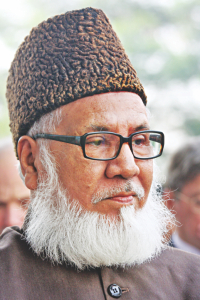Bangladesh: The Hanging of Nizami and the Grip on Political Power

The head of Bangladesh’s leading Islamic party, the Jamaat-e-Islami,(JI) Motiur Rahman Nizami was hanged at Dhaka Central jail at one minute past midnight on Wednesday 11 May 2016. In 2014, a death sentence was imposed on him by a special tribunal for allegedly committing genocide and rape and orchestrating the massacre of intellectuals during the 1971 war of independence when East Pakistan— what is today Bangladesh — broke away from Pakistan.
The death sentence against Nizami has been condemned by government leaders and opposition figures from a number of countries, apart from human rights organisations, other civil society groups, and intellectuals. For many of them, the so-called ‘evidence’ against Nizami was weak and appeared to be fabricated; the trial itself was faulty and the verdict was from all accounts pre-determined. The entire trial process violated established international norms and standards.
This was also true of the other four high profile political leaders executed before Nizami— a point we had made in the past. Three of them were from the JI while the fourth was from the opposition Bangladesh Nationalist Party (BNP). Like Nizami, they were all accused of crimes committed during the 1971 war. It is bizarre that these allegations against the five and a number of others were made only in 2010, almost 40 years after the 1971 war. No allegation of war crimes was made in the early seventies when the founder of the Bangladeshi State, the late Sheikh Mujibur Rahman (the father of the present Prime Minister, Sheikh Hasina) was in charge. Even when his party, the Awami League,(AL) was in power again from 1996-2001, with his daughter at the helm, no one was hauled to court on accusations of war crimes. It was after the AL came to power a third time in 2009 that Hasina decided to move against ‘war criminals’ from the JI and the BNP.
It is partly because of this strange hiatus in time that many commentators and observers are convinced that the trials were all politically motivated. They are part of a larger scheme to weaken the JI and the BNP and to strengthen the AL’s grip upon power.
In the short run, the AL may succeed. But will it be able to perpetuate its power well into the future?
The suppression of dissent through the use of brute force — as demonstrated again and again in history — leads eventually to instability and chaos. The perpetrators and their descendants will also have to bear the dire consequences of their suppression and oppression. The winners will then realise that they are actually the losers.
Dr. Chandra Muzaffar, President, International Movement for a Just World (JUST), Malaysia.

